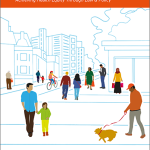Community Health
Episode 1: Growing policy solutions for improved community health
What work is happening at the local level to change policies and transform systems in ways that address structural inequities?
How are leaders taking action to nurture collaborative partnerships, build community capacity to advocate for change, and strengthen processes to shift power and decisionmaking to community members?
Growing Policy Solutions for Improved Community Health lays the groundwork for our virtual discussion series Uprooting the Structural Drivers of Health Inequities. The panelists investigate what the drivers of health inequity are and how different sectors — including community-based organizations, government, and funders — are addressing inequity and advancing structural solutions.
Expert Panel
- Sarah de Guia, JD, CEO at ChangeLab Solutions (moderator)
- Oxiris Barbot, MD, adjunct assistant professor at Columbia University Mailman School of Public Health and senior fellow for public health and social justice at The JPB Foundation
- Wendoly Marte, director of economic justice at Community Change
- Cara James, PhD, president and CEO of Grantmakers in Health
Highlights
Our experts reflect on lessons from the pandemic and how to shape a more inclusive policy agenda for the future.
The importance of having true, meaningful community partnerships is that government leans on communities for community to lead. That takes evolved leaders, to understand that having community at the table doesn’t mean giving up power; it actually means building more power for everyone. ―Dr. Oxiris Barbot
The power of law and policy: One of the most powerful risk factors in health is unjust laws and policies — those that have perpetuated racism, discrimination, and segregation through our nation’s history. At the same time, laws and policies are necessary tools for change. They have the power to undo historical harms, affect large groups of people, and engage changemakers. ―Sarah de Guia
Community partnerships and co-governance: The importance of having true, meaningful community partnerships is that government leans on communities for community to lead. That takes evolved leaders, to understand that having community at the table doesn’t mean giving up power; it actually means building more power for everyone. ―Dr. Oxiris Barbot
Rural communities: Many rural communities have been chronically, historically disinvested. Despite challenges of internet access, we’ve been able to do digital organizing for COVID in places where we haven’t had a physical reach in the past. How do we meet people where they’re at? Find them online. ―Wendoly Marte
Rural communities: Two key factors for engaging in rural communities are entering with cultural humility and building relationships over time. It needs to be a sustained effort. A significant challenge is that we’re trying to build trust in the middle of the pandemic without a foundation for engaging. That’s something that we need to build up in normal times, so that when there’s an emergency, we can come together. ―Cara James
The surprise people continue to have at the disproportionate impact on people of color is no longer acceptable. The five drivers of inequity play out in every facet of our lives. We need to think about that and build supportive systems from the start. ―Cara James
Lessons from the pandemic: We’re now asking, "How can we create a thread between the short-term needs and the long-term opportunities to advance health and racial equity across the board?" Invisible work, care work, and essential work have become a lot more visible this year. Populations in these sectors have traditionally been overlooked and undervalued; and they’re predominantly women. In a just recovery, we have a responsibility to make sure that these workers are centered. ―Wendoly Marte
Lessons from the pandemic: The surprise people continue to have at the disproportionate impact on people of color is no longer acceptable. The five drivers of inequity play out in every facet of our lives. We need to think about that and build supportive systems from the start. ―Cara James
Resources
- Measure A campaign case study
- Creating a Force Multiplier: Why Advocates for Rural Health and Health Equity Should Work Together
Watch a recording of episode 1:


